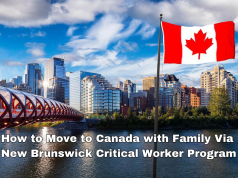Canada, a country in North America is renowned for its stunning landscapes, welcoming residents, excellent education system, and reliable security system among others. These features make it a highly desirable destination for many individuals eager to explore the country. If you are ready to come to Canada, then this article is for you! Here, we unveil 8 things you need to successfully migrate to Canada.
8 Things You Need to Successfully Migrate to Canada.
The following are 8 things you should bear in mind if you wish to migrate to Canada successfully:
1. Prepare your Passport and Visa
Your passport and visa are one of the most important things you should prepare to successfully migrate to Canada. The type of visa you should have depends on whether you want to be a permanent resident or you want to move temporarily, the purpose of travel etc. Different types of Canadian visas include Canadian Tourist Visa, Canada Business Visa, Canadian Student Visa, and Self-Employed Persons Visa among others. Noteworthy, your passport must be valid and remain so throughout your intended stay in the country. Additionally, you may be asked to provide photocopies of the data page of your international passport, which includes the following your passport number, the date of issue and expiration, your personal information consisting of your name, photograph, place of birth, and date of birth etc. Ensure that you have the original copies of your passport and visa for yourself and any family member if necessary.
2. Immigration Documents
Before relocating to Canada, it is crucial to ensure that all your paperwork is properly organized and prepared. It is important to refrain from packing these documents in your luggage and instead, ensure they are kept with you at all times. The exact documents you would need depend on the kind of visa you have applied for. For instance, a person who has a student visa would need to provide an acceptance letter from a designated learning institution. However, this is not mandatory for someone who applied for a business visa. If you are from a country that doesn’t communicate in English or French, official translations of your documents may be required in many cases.
Ensure that you possess original copies of these essential documents required for you or any members of your family. If you lack any of the important documents then it is important to start applying for them as soon as possible as some of these take time to process. Obtaining these documents after your arrival in Canada can result in additional expenses and prolonged processing time. Ensure that you engage the services of a trustworthy translation agency and obtain an affidavit confirming the accuracy of the translation. Additionally, it is advisable to have photocopies, digital copies, or certified true copies of all your important documents. These copies will prove helpful for multiple applications or in the event of misplacing the original document.
3. Determine where to Live in Canada
Sorting out accommodation before moving to Canada is an important step in ensuring a smooth transition. When calculating your monthly expenses in Canada, take into account the type of housing you desire as well as essential needs like transportation, education, food, clothing, utilities, and entertainment. You also need to be sure of the Canadian province you want to live in. Consider the diverse range of climates, ranging from the colder winters in the northern regions to the milder temperatures found in the southern parts of the country. When considering a specific area of interest in Canada, it is also essential to consider the cost of living. As a large country, Canada has significant variations in the cost of living across different provinces. For instance, Ontario has a higher cost of living compared to Newfoundland and Labrador.
Your choice of the province to settle in will have a direct impact on the job opportunities available, your quality of life, educational options for your children, and the cultural atmosphere you’ll experience. Additionally, several provinces offer Provincial Nominee Programs, which invite immigrants with valuable skills to meet the region’s specific demands for in-demand occupations. Before moving to Canada, it is advisable to conduct thorough research on the provinces and territories, major cities preferred by newcomers, and the job market. This research will assist you in determining the province where you would like to reside. Afterwards, secure accommodation in advance before you move. Renting an apartment in major cities like Toronto and Vancouver typically takes a few days to a month, so it is advisable to complete your search and sign a lease before embarking on your journey to ensure a smooth transition to your new country.
4. Secure a Job
When planning a move to Canada, finding employment is a crucial aspect to consider. The Government of Canada’s Job Bank provides valuable resources for newcomers, such as job listings, comprehensive information about the job market, and guidance on crafting effective resumes and cover letters. Make use of the National Occupational Classification (NOC) system to explore job opportunities on the Canada Job Bank. Examine key details such as standard wages, job outlook, educational prerequisites, and specific job requirements. It is pertinent to determine if your profession is regulated, as this may require undergoing a qualification recognition process to obtain the necessary licensing or certification to practice your occupation. Check out the demand for your profession and identify the specific skills and qualifications that companies seek. Once you feel prepared, proceed to submit your application, ensuring that you present a Canadian-style resume tailored to the expectations of Canadian employers.
5. Have Enough Money
Ensure you have sufficient funds to cover out-of-pocket expenses upon your arrival in Canada before your bank account is fully activated. You may also decide to order Canadian currency before you move to Canada. This can be a convenient option to have some cash on hand upon your arrival until you get a debit or credit card.
While it’s not a mandatory requirement, having Canadian currency can be useful for immediate expenses, such as transportation, meals, and other immediate needs upon arrival. You can also work on opening a Canadian bank account. When entering Canada, it may be necessary to show that you possess the necessary funds to support your family. This can be a lot easier if the funds are already deposited in a Canadian bank account under your name. If you are carrying $10,000 or more, whether in Canadian dollars (cash, cheques, etc.) or the equivalent amount in your country’s currency, it is mandatory to report it to the Canada Border Services Agency.
6. Know Border Rules
It is important to familiarize yourself with the border rules and regulations before coming to Canada. Understanding the entry requirements and adhering to immigration and customs procedures will help ensure a smooth and hassle-free entry into the country. This would help you know the eligibility criteria and required documents for entry into Canada and determine if you meet the requirements and avoid any complications or issues at the border.
Apart from this, Canada has specific regulations regarding the items you can bring into the country and the duty or taxes applicable to certain goods. Being aware of these customs rules will prevent any issues with prohibited items or excess duty charges. To stay informed about the border rules, check out the official websites of the Government of Canada, including the Canadian Border Services Agency (CBSA) and Immigration, Refugees and Citizenship Canada (IRCC). These sources provide up-to-date information and guidelines to help you prepare for your entry into Canada.
7. Plan for Health Insurance
Health insurance is an important consideration when planning to move to Canada. Canada has a publicly funded healthcare system which provides essential medical services to Canadian citizens and permanent residents. Each province and territory manages its health insurance plan, and coverage can vary slightly. Upon becoming a permanent resident, you will generally be eligible for provincial health coverage. While provincial health plans cover essential medical services, there may be certain medical expenses that are not covered, such as prescription medications, dental care, or vision care. It is advisable to consider additional private health insurance to supplement any gaps in coverage. During the initial 90 days of your stay in Canada, your provincial government-sponsored health insurance plan will not be in effect. To ensure you have coverage during this period, it is advisable to explore the option of purchasing Visitors to Canada Insurance.
8. Work on your Language Skills
Canada is a country that welcomes immigrants from various parts of the world, resulting in a multicultural society. Consequently, you are likely to encounter individuals who speak your native language. Nevertheless, it remains important to be proficient in one or both of the country’s official languages which are English and French.
It is recommended to enhance your English language skills by using online resources or enrolling in language classes. Additionally, if you intend to live in Quebec, it is important to be fluent in French to ensure effective communication and adaptation within the province.
Conclusion
Canada is one of the best places anyone can think of migrating to. However, before you migrate to Canada, there are some things you have to consider and put in place. This article has just highlighted 8 important things you need to successfully migrate to Canada.




